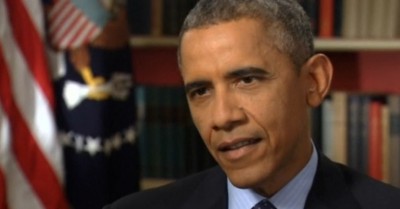As Bibi Marches on Congress, Obama Says if Iran Talks Fail ‘Military Actions’ Await

Obama indicates that remaining options would be limited, including additional sanctions or military actions, if ongoing negotiations with Tehran fail. ‘Why wouldn’t we take that deal?’ the president asked, if there are assurances Iran cannot build a covert nuclear weapons program. (Image: Screenshot/Reuters)
Though voicing no overall criticism of Israeli state policy when it comes various issues involving regional politics, its own nuclear weapons program, or its treatment of Palestinians in the occupied West Bank and the Gaza Strip, the number of U.S. lawmakers who now say they will not attend the speech of Prime Minister Benjamin Netanyahu on Tuesday has grown to nearly 60 members of Congress, with high-profile Democratic Senators Elizabeth Warren and Al Franken among the most recent to register their objection to the address.
According to The Hill on Tuesday, nearly a quarter of House Democrats will not attend.
Meanwhile, President Obama sat down with the Reuters news agency and offered his most detailed comments yet about the so-called “rift” that has publicly percolated around the prime minister’s decision to address the joint session just weeks ahead of Israeli elections. The speech also comes amid tense, high-level talks in Switzerland this week, where Iran and the P5+1 nations (the U.S., U.K., China, Russia, France, and Germany) are in the final stages of trying to reach a deal on monitoring for Iran’s nuclear program in exchange for sanctions relief.
Declaring her reasons for not attending the speech, Sen. Warren said, “It’s unfortunate that Speaker Boehner’s actions on the eve of a national election in Israel have made Tuesday’s event more political and less helpful for addressing the critical issue of nuclear nonproliferation and the safety of our most important ally in the Middle East.”
For his part, Sen. Franken said he would not attend Netanyahu’s speech because it had devolved into a “partisan spectacle” he wants no part of. “I’d be uncomfortable being part of an event that I don’t believe should be happening,” Franken said. “I’m confident that, once this episode is over, we can reaffirm our strong tradition of bipartisan support for Israel.”
In his remarks to Reuters, President Obama also affirmed the “depth of the U.S./Israeli relationship” – a bond, he said, that would never be broken.
“I don’t think it’s permamently destructive,” Obama told Reuters in reference to Netanyahu’s visit, “but I think it’s a distraction from what should be our focus. And our focus should be: how do we stop Iran from getting a nuclear weapon?”
“Why not wait to see if there’s actually going to be a deal – can Iran accept the terms that we’re laying out. If, in fact, Iran can accept terns that would ensure a one-year breakout period, for ten years or longer—and during that period we know that Iran is not developing a nuclear weapon; we have inspectors on the ground that give us assurances that they’re not creating a covert program—why would we not take that deal when we know that the alternatives—whether through sanctions or military actions—will not result in as much assurance that Iran is [or is not] developing a nuclear weapon? There’s no good reason not to let these negotiations play themselves out.”
Obama added, “If, in fact, a deal is arrived at, that it’s going to be a deal that is most likely to prevent Iran from getting a nuclear weapon.”
Obama said that in his mind it’s “still more likely than not” that Tehran will back away from finalizing a deal, but added that “in fairness to them, they have been serious negotiators” and acknowledged that internal Iranian politics have their own potent dynamics. That said, Obama continued, “It is more likely we could get a deal now than it was three or five months ago.”
On Monday, Iranian Foreign Minister Mohammad Javad Zarif said that if the U.S. could find the political will, he was sure “we can have an agreement this time.”

